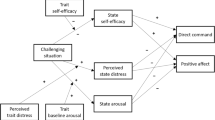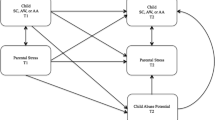Abstract
Cumulative stress and trauma in parents may alter autonomic function. Both may negatively impact child behaviors, however these links have not been well established. We tested hypotheses that parent stress and trauma are associated with and interact with altered autonomic function during the toy wait task, an acute parent–child interaction challenge, to predict greater negative child behaviors. Sixty-eight parents and their 2–5 year old children were enrolled. More parent major and traumatic life events, and more parent recent life events coupled with increased heart rate and decreased heart rate variability (HRV), each related to more child disruptive/aggressive behavior. More major life and traumatic life events coupled with greater HRV predicted more child attention seeking behavior. Our novel approach to assessing parental life stress offers a unique perspective. Interventions mitigating parent stress and regulating physiological coping during parent–child interactions may both promote better parent health and improve child behavioral outcomes.




Similar content being viewed by others
References
Peris TS, Miklowitz DJ (2015) Parental expressed emotion and youth psychopathology: new directions for an old construct. Child Psychiatry Hum Dev 46(6):863–873
Giallo R et al (2014) Maternal postnatal mental health and later emotional–behavioural development of children: the mediating role of parenting behaviour. Child Care Health Dev 40(3):327–336
Huang CY et al (2014) Parenting stress, social support, and depression for ethnic minority adolescent mothers: impact on child development. J Child Fam Stud 23(2):255–262
Cohen LR, Hien DA, Batchelder S (2008) The impact of cumulative maternal trauma and diagnosis on parenting behavior. Child Maltreat 13(1):27–38
Banyard VL, Williams LM, Siegel JA (2003) The impact of complex trauma and depression on parenting: an exploration of mediating risk and protective factors. Child Maltreat 8(4):334–349
Garcia AS, Alampay LP (2012) Parental efficacy, experience of stressful life events, and child externalizing behavior as predictors of Filipino mothers’ and fathers’ parental hostility and aggression. Philipp J Psychol 45(1):1
Stover CS et al (2016) Marital hostility, hostile parenting, and child aggression: associations from toddlerhood to school age. J Am Acad Child Adolesc Psychiatry 55(3):235–242
Sturge-Apple ML, Davies PT, Cummings EM (2006) Impact of hostility and withdrawal in interparental conflict on parental emotional unavailability and children’s adjustment difficulties. Child Dev 77(6):1623–1641
Association AP (2020), Stress in America 2020: a national mental health crisis. Diakses dari: apa. https://www.apa.org/news/press/releases/stress/2020/report-october. Accessed Aug 2021
Saad L (2017) Eight in 10 Americans afflicted by stress. Gallup, Washington
Lloyd DA, Turner RJ (2003) Cumulative adversity and posttraumatic stress disorder: evidence from a diverse community sample of young adults. Am J Orthopsychiatry 73(4):381–391
Turner RJ, Wheaton B (1995) Checklist measurement of stressful life events. In: Cohen S, Kessler RC, Gordon LU (eds) Measuring stress: a guide for health and social scientists. Oxford University Press, pp 29–58
Abravanel BT, Sinha R (2015) Emotion dysregulation mediates the relationship between lifetime cumulative adversity and depressive symptomatology. J Psychiatr Res 61:89–96
Repetti RL (1994) Short-term and long-term processes linking job stressors to father–child interaction. Soc Dev 3(1):1–15
McQuillan ME et al (2021) A 1-year longitudinal study of the stress, sleep, and parenting of mothers of toddlers. Sleep Health 8(1):47–53
Choi KJ, Kangas M (2020) Impact of maternal betrayal trauma on parent and child well-being: attachment style and emotion regulation as moderators. Psychol Trauma Theory Res Pract Policy 12(2):121
van Ee E, Kleber RJ, Mooren TT (2012) War trauma lingers on: associations between maternal posttraumatic stress disorder, parent–child interaction, and child development. Infant Ment Health J 33(5):459–468
Beck AN et al (2010) Partnership transitions and maternal parenting. J Marriage Fam 72(2):219–233
Hussong AM et al (2008) Disaggregating the distal, proximal, and time-varying effects of parent alcoholism on children’s internalizing symptoms. J Abnorm Child Psychol 36(3):335–346
Acharya UR et al (2006) Heart rate variability: a review. Med Biol Eng Comput 44(12):1031–1051
Kim H-G et al (2018) Stress and heart rate variability: a meta-analysis and review of the literature. Psychiatry Investig 15(3):235
Lampert R et al (2016) Cumulative stress and autonomic dysregulation in a community sample. Stress 19(3):269–279
Sin NL et al (2016) Linking daily stress processes and laboratory-based heart rate variability in a national sample of midlife and older adults. Psychosom Med 78(5):573
Boesch M et al (2014) Mood and autonomic responses to repeated exposure to the Trier Social Stress Test for Groups (TSST-G). Psychoneuroendocrinology 43:41–51
Sack M, Cillien M, Hopper JW (2012) Acute dissociation and cardiac reactivity to script-driven imagery in trauma-related disorders. Eur J Psychotraumatol 3(1):17419
Xin Y et al (2020) Recent life stress predicts blunted acute stress response and the role of executive control. Stress 23(3):359–367
Thayer JF et al (2009) Heart rate variability, prefrontal neural function, and cognitive performance: the neurovisceral integration perspective on self-regulation, adaptation, and health. Ann Behav Med 37(2):141–153
Thayer J (2009) Heart rate variability: a neurovisceral integration model. Elsevier, Amsterdam
Smith R et al (2017) The hierarchical basis of neurovisceral integration. Neurosci Biobehav Rev 75:274–296
Thayer JF, Yamamoto SS, Brosschot JF (2010) The relationship of autonomic imbalance, heart rate variability and cardiovascular disease risk factors. Int J Cardiol 141(2):122–131
Kemp AH, Quintana DS (2013) The relationship between mental and physical health: insights from the study of heart rate variability. Int J Psychophysiol 89(3):288–296
Lampert R (2015) ECG signatures of psychological stress. J Electrocardiol 48(6):1000–1005
Masten AS, Best KM, Garmezy N (1990) Resilience and development: contributions from the study of children who overcome adversity. Dev Psychopathol 2(4):425–444
Garmezy N (1992) Risk and protective factors in the development of psychopathology. Cambridge University Press, Cambridge
Rutter M (2007) Resilience, competence, and coping. Child Abuse Negl 31(3):205–209. https://doi.org/10.1016/j.chiabu.2007.02.001
Chaplin TM et al (2009) Emotional arousal in cocaine exposed toddlers: prediction of behavior problems. Neurotoxicol Teratol 31(5):275–282
Coatsworth JD et al (2010) Changing parent’s mindfulness, child management skills and relationship quality with their youth: results from a randomized pilot intervention trial. J Child Fam Stud 19(2):203–217
Jastreboff AM et al (2018) Preventing childhood obesity through a mindfulness-based parent stress intervention: a randomized pilot study. J Pediatr 202:136-142.e1
Cole PM et al (2011) Developmental changes in anger expression and attention focus: learning to wait. Dev Psychol 47(4):1078
Cole PM, LeDonne EN, Tan PZ (2013) A longitudinal examination of maternal emotions in relation to young children’s developing self-regulation. Parenting 13(2):113–132
Dennis TA et al (2009) The functional organization of preschool-age children’s emotion expressions and actions in challenging situations. Emotion 9(4):520
Gilliom M et al (2002) Anger regulation in disadvantaged preschool boys: strategies, antecedents, and the development of self-control. Dev Psychol 38(2):222
R Core Team (2021) R: A language and environment for statistical computing. R Foundation for Statistical Computing, Vienna, Austria. https://www.R-project.org/
Kunzetsova A, Brockhoff P, Christensen R (2017) lmerTest package: tests in linear mixed effect models. J Stat Softw 82:1–26
Iacobucci D et al (2016) Mean centering helps alleviate “micro” but not “macro” multicollinearity. Behav Res Methods 48(4):1308–1317
Campbell SB et al (1986) Correlates and predictors of hyperactivity and aggression: a longitudinal study of parent-referred problem preschoolers. J Abnorm Child Psychol 14(2):217–234
Belsky J (1984) The determinants of parenting: a process model. Child Devel 55:83–96
West KB et al (2021) Preschoolers’ dynamic respiratory sinus arrhythmia (RSA) change during a challenging parent-child interactive task: relations with preschoolers’ socioemotional health. Dev Psychobiol 63(5):1132–1145
Cooley ME et al (2014) Parent–child interaction therapy: a meta-analysis of child behavior outcomes and parent stress. J Fam Soc Work 17(3):191–208
Eyberg SM, Boggs SR, Rodriguez CM (1993) Relationships between maternal parenting stress and child disruptive behavior. Child Fam Behav Ther 14(4):1–9
Luque-Casado A et al (2016) Heart rate variability and cognitive processing: the autonomic response to task demands. Biol Psychol 113:83–90
Lougheed JP et al (2019) Multilevel survival analysis: studying the timing of children’s recurring behaviors. Dev Psychol 55(1):53
Taelman J et al (2009) Influence of mental stress on heart rate and heart rate variability. 4th European conference of the international federation for medical and biological engineering. Springer, Cham
Pereira T et al (2017) Heart rate variability metrics for fine-grained stress level assessment. Comput Methods Programs Biomed 148:71–80
Sigrist C et al (2020) Early life maltreatment and resting-state heart rate variability: a systematic review and meta-analysis. Neurosci Biobehav Rev 120:307–334
Niehaus CE et al (2019) Maternal emotional and physiological reactivity: implications for parenting and the parenting–adolescent relationship. J Child Fam Stud 28(3):872–883
Bale TL, Epperson CN (2015) Sex differences and stress across the lifespan. Nat Neurosci 18(10):1413–1420
Brougham RR et al (2009) Stress, sex differences, and coping strategies among college students. Curr Psychol 28(2):85–97
Molfino A et al (2009) Body mass index is related to autonomic nervous system activity as measured by heart rate variability. Eur J Clin Nutr 63(10):1263–1265
Koenig J et al (2014) Body mass index is related to autonomic nervous system activity as measured by heart rate variability—a replication using short term measurements. J Nutr Health Aging 18(3):300–302
Funding
Supported by R01-DK117651 and R21-AT007708.
Author information
Authors and Affiliations
Corresponding author
Ethics declarations
Conflict of interest
A.M. Jastreboff is on the Scientific Advisory Board/Consultant for Novo Nordisk, Eli Lilly, Boehringer Ingelheim, Intellihealth, Scholar Rock, Pfizer, and Rhythm Pharmaceuticals. All other authors have no disclosures or conflicts of interest to report.
Ethical Approval
All procedures performed in studies involving human participants were in accordance with the ethical standards of the institutional and/or national research committee and with the 1964 Helsinki declaration and its later amendments or comparable ethical standards.
Additional information
Publisher's Note
Springer Nature remains neutral with regard to jurisdictional claims in published maps and institutional affiliations.
Rights and permissions
About this article
Cite this article
Fogelman, N., Schwartz, J., Chaplin, T.M. et al. Parent Stress and Trauma, Autonomic Responses, and Negative Child Behaviors. Child Psychiatry Hum Dev 54, 1779–1788 (2023). https://doi.org/10.1007/s10578-022-01377-w
Accepted:
Published:
Issue Date:
DOI: https://doi.org/10.1007/s10578-022-01377-w




